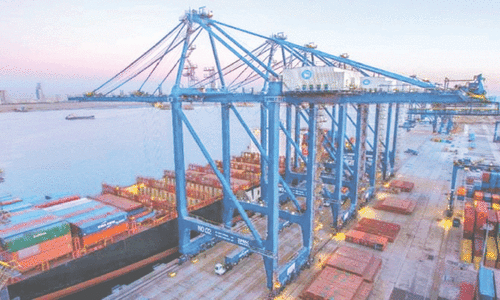During the last fiscal year that ended on June 30, Pakistan’s exports (fob value) increased to $31.1 billion whereas imports consumed $53.2bn, leaving a trade deficit of $22.1bn, according to the latest balance of payments statement.
Although this volume of deficit is lower compared to the deficit of $24.8bn recorded a year earlier, the country’s precarious external finance situation requires further reduction during this year to minimise the overall external financing gap that is projected to remain close to $20bn. That is possible only with a dramatic rise in export earnings.
There is no room left for further containment of imports for two reasons: The targeted economic growth rate of 3.5pc set for this fiscal year cannot be achieved if imports are further curtailed, and the International Monetary Fund (IMF) is against such moves during the new three-year $7bn Extended Fund Facility. In fact, the IMF has asked Pakistani authorities to draw an export strategy that keeps this in mind and focuses on product diversification and value addition.
In the last two fiscal years goods imports remained low ($53.1bn in FY24 and $52.7bn in FY23 much lower than $71.5bn in FY22) primarily due to strict tariff and non-tariff measures imposed to contain the import bill.
During these two years, the IMF encouraged Pakistani authorities to relax import restrictions but remained lenient keeping in view the forex crisis in the country.
Curtailing imports to contain the current account deficit is no longer conducive; exports need to be improved, keeping in mind product diversification
The forex crisis was so acute that the State Bank of Pakistan’s (SBP) forex reserves first fell from $9.8bn in FY22 to $4.4bn in FY23 and rose gradually to about $9.4bn at the end of FY24 only after China, the United Arab Emirates (UAE), and Saudi Arabia rolled over billions of dollars of funds they had placed with SBP.
The IMF also supported Pakistan with a short-term $1.3bn loan. Currently, forex reserves with the SBP stand at $9.03bn (as of July 19), or equal to two months of goods’ imports.
Looking at the low level of forex reserves and considering that in the last fiscal year, the need to boost exports has become obvious. However, that is not possible without product diversification, more value-addition, further penetration into existing export markets and active exploration of new markets.
This to-do list is simple, but its implementation is too difficult, more so amidst the current chaotic local politics, mounting economic challenges and pressing geopolitical compulsions. Add to this list of obstacles the ongoing, unprecedented energy crisis and you will get a clearer picture of why boosting merchandise exports during this fiscal year, and in perhaps in next two years, isn’t so easy.
In the first eleven months of the last fiscal year, large-scale manufacturing output grew by just 1pc, according to the Pakistan Bureau of Statistics, primarily due to big, unprecedented hikes in energy prices, political uncertainty and high interest rates. Towards the end of the last fiscal, the SBP eased interest rates from 22pc to 20.5pc.
External financing gap is expected to remain around $20bn this year
However, the high prices of fuel oil, gas and electricity continue to rise further as the government collects more revenue from fuel oil and is trying to contain the energy sector’s circular debts worth trillions of rupees.
The circular debts piled up over three decades chiefly due to corruption, inefficiency and mismanagement of successive governments and energy price increases to contain their growth in the past two years have tested people and businesses to their limits. That is why individuals and firms are in no mood to pay more for energy supplies and their protests over fatter electricity bills are growing louder with each passing day.
In this environment which has become even more business unfriendly due to growing political uncertainty and the ongoing tussle between PTI and the current regime, should we expect export-oriented industries to take a long-term view and invest significantly in product diversification and value-addition?
Even more critical, at a time when business lobbies and chambers of commerce and industries are warning of business closures due to unaffordable production costs, while Karachi-based businesses express concern about rising crime rates and their impact on investors and investments, should we expect a turnaround in exports at all?
As for penetrating deeper into existing export markets — Afghanistan, China, Bangladesh, the United States (US), Europe and the Gulf Cooperation Council (GCC) — our tense relations with Afghanistan and the current turmoil in Bangladesh’s domestic politics pose serious challenges. Equally challenging is the case of the US and Europe due to the unpredictable relationship Pakistan has with the West.
Besides, continuously meeting high standards of the US and European buyers and still being competitive in pricing has become very difficult for most Pakistani exporters whose energy bills, workers’ wages and financial cost of production are all on the rise. Only easing the interest rate isn’t going to make any big difference.
On the other hand, exports to China that have already been growing steadily may grow further with the launching of the second phase of the China Pakistan Economic Corridor and because the cost of trading with our neighbour is far lower than trading with the faraway Western or North African countries.
Exports to the GCC region may also keep growing because of the friendly relationship Pakistan has with Saudi Arabia and UAE and because of the presence of millions of overseas Pakistanis in these two countries.
Published in Dawn, The Business and Finance Weekly, July 29th, 2024
















































Dear visitor, the comments section is undergoing an overhaul and will return soon.